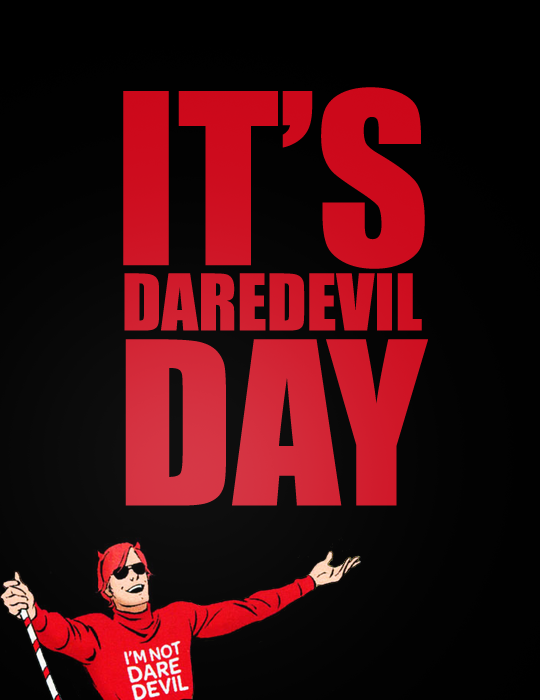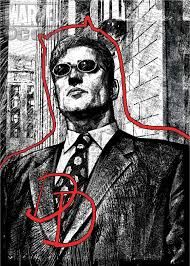I'll admit it: I fell asleep at midnight last night. I got really close to the debut of Netflix's Daredevil series, and stayed up as late as my poor brain could take, but then the next thing you know it was 7 a.m. and I had a kid who wanted breakfast.
Early reviews have been extremely positive; sure, everyone's going to make the same Ben Affleck jokes, but I think a TV series is better venue for the Man Without Fear than a two-hour movie (good gracious, that was a long movie!). Due to his court dealings and his continual fights against similar foes (or just the Kingpin over and over), Daredevil better suited to the episodic format. His roots are in a quantifiable location, and his threat level remains the same. There's a reason you don't see Daredevil on the moon fighting Galactus; he's just not that kind of guy.
His origins are very humble and, radioactive goo aside, very practical. In fact, if you break apart his backstory, you could get a variety of shows and movies out of Matt Murdock, yet none of them would inform all that much on the man he is today. Despite his early years, Matt Murdock is so closely associated with the Frank Miller era that the most important book for new fans to read is still Daredevil: The Man Without Fear. We're lucky the new TV show seems to be skipping the steps it took to get to be Daredevil and going right for why he's so cool now. It would be really easy to slow everything down to a step-by-step guide to being the Man Without Fear, but then when would we get to the kicky-punchy parts?
Origins are important to lure in new viewers to film and television. Comic fans just want to see how their favorite characters and stories are adapted to the big or small screen; new fans want more. They need to be there at the start to feel included. It's why politicians always talk about where they grew up, rather than how they got the skills to be a lawmaker. It's why magazine articles on successful people talk about their origins as if they were superheroes. We love the idea that someone could go from zero to a hero so much, the United States made it their "American Dream."
Daredevil, in a way, almost has too much origin. There are so many fascinating parts to who Matt Murdock was as a child, who raised him and who inspired him that you could easily dawdle in the past and forget that you're supposed to be getting to the part where he jumps off rooftops and punches bad guys. His father was Battling Jack Murdock, a boxer and a single parent, making him a Lifetime movie right out off the bat. He pushed his son into more intellectual pursuits so he wouldn't wind up like his old man, making me wonder how Jack got into the boxing business to begin with. Matt started out with a mother who had "died," but it was later revealed that she was not only still alive, but a nun as well. Daredevil's parents are practically a tale unto themselves; their stories are human and dramatic, but also self-contained. In the same way that Peter Parker's parents being spies doesn't really change who Spider-Man is and what he does, Matt Murdock's parents are inspirational, but they don't really have that much of an impact on Daredevil's daily life.
Matt's father dies from a mob hit, and Matt becomes a lawyer -- already it sounds like a solid Law & Order spinoff. Take out the martial arts and superpowers, even his blindness, and Matt Murdock is still a fascinating enough character to warrant a TV show.
This is a man who knows about the perils of organized crime and has dedicated his life to fighting the way his father wanted him to: with his intellect. This is plenty of motivation and drama to propel lots of stories, but then we add martial arts to the mix. This is another part of the Daredevil mythos that can fuel plenty of stories, one aspect removed from the whole that's fascinating enough to dwell upon. "A blind man receives kung-fu training from a mysterious stranger" sounds like a David Carradine vehicle. Matt Murdock doesn't even need to enter a courtroom to be interesting; he could simply be walking the Earth, righting wrongs. He doesn't need to be Daredevil, there's enough in his origin alone to create a few unique heroes on their own and that's why spending too much time on who he was and where he came from can be detrimental to audiences being interested in him now.
Take Batman, for example: As a boy, he lost his parents to crime and has since devoted himself to fighting crime. That's all we need to know. Martha and Thomas Wayne can be interesting people on their own, but we don't need them to be. Why or how Thomas Wayne inspired Bruce to be a good person isn't all that interesting or necessary to understanding who Batman is. All we need from Bruce Wayne's parents is for them to be dead so Batman can get to Batman-ing around. Daredevil, on the other hand, is a blind lawyer by day who fights crime with super-senses at night. If you need to simplify the character, it's easier not to even factor his beginnings into the equation. There are themes from his childhood and training that can influence who he is, but the more you get into the details, it's really easy to get sidetracked and forget you're supposed to be talking about hero outside the mask.
Matt Murdock is a fascinating character, tailor-made for tons of different types of stories, from the small-scale personal drama between a son and his father to the epic fights involving ninjas and destiny. As long as we move beyond his past, and move him into being the hero he is today, the Netflix series will definitely have a future.




